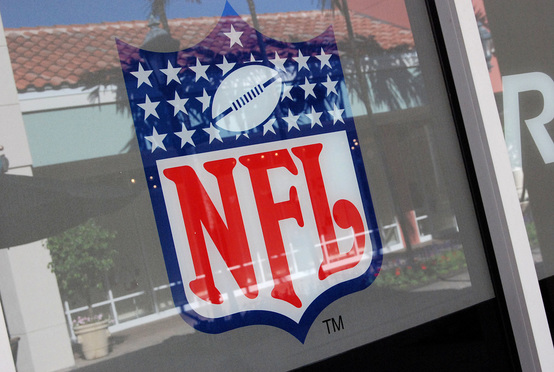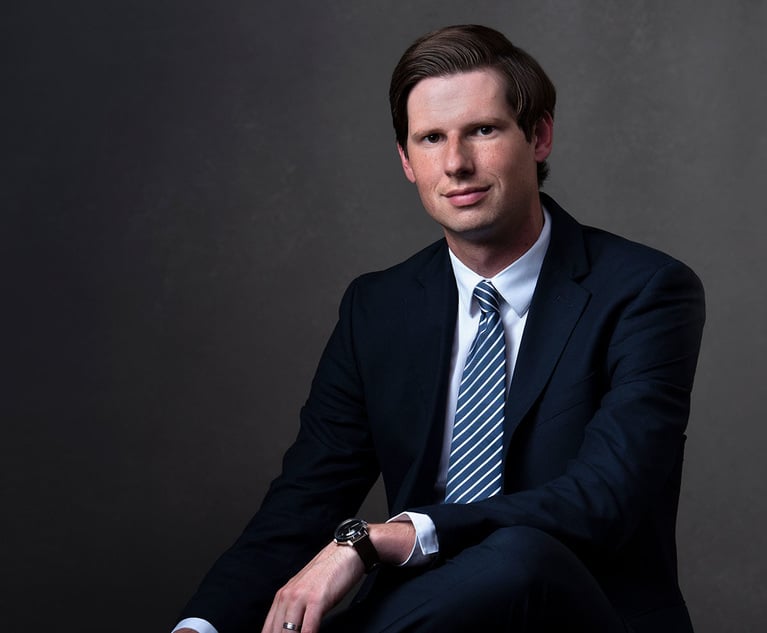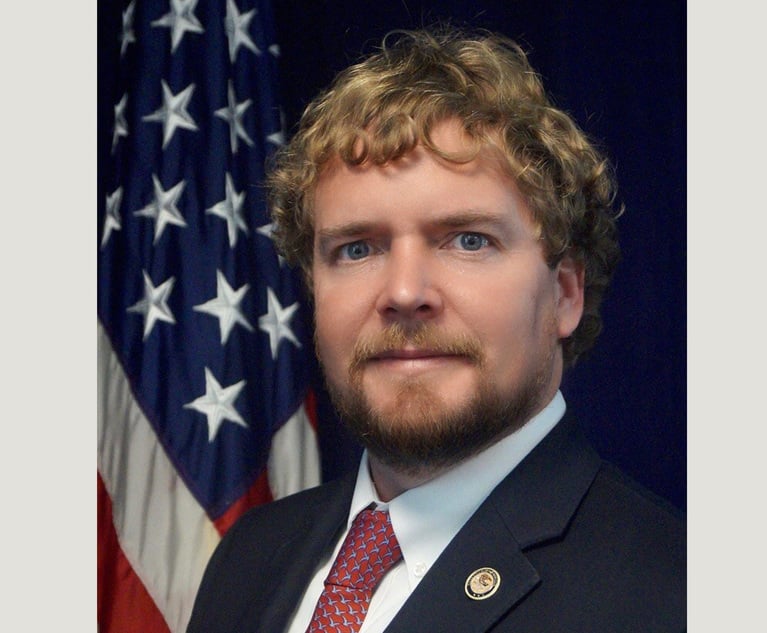How NFL, 9/11 Settlements Could Complicate Emerging Law on Litigation Funding
A clear line of case law is emerging that holds litigation funding agreements are generally not subject to state usury restrictions, but a pair of high-profile cases—one that arose out of the $1 billion NFL concussion settlement and the other linked to a fund for 9/11 victims—may complicate matters.
March 08, 2018 at 06:05 PM
7 minute read
 Photo: Flickr user hyku via Wikimedia Commons.
Photo: Flickr user hyku via Wikimedia Commons. A clear line of case law is emerging that holds litigation funding agreements are generally not subject to state usury restrictions, but a pair of high-profile cases—one that arose out of the $1 billion NFL concussion settlement and the other linked to a fund for 9/11 victims—may complicate matters.
Late last year, U.S. District Judge Anita Brody of the Eastern District of Pennsylvania, who is overseeing the concussion litigation, barred third-party litigation funders from entering into assignment agreements with plaintiffs in the class action, and ordered the claims administrator of the $1 billion settlement to pay the ex-players directly.
At the same time, another dispute has arisen in New York federal court raising similar questions about the types of funding agreements companies can enter into with claimants seeking recovery from established funds. That case is Consumer Financial Protection Bureau v. RD Legal Funding, and it primarily involves the fund meant to compensate victims of the 9/11 terrorist attacks.
Brody's ruling in the NFL settlement is now on appeal to the Third Circuit, and, in the past few weeks, several briefs have been filed before U.S. District Judge Loretta Preska of the Southern District of New York regarding whether the 9/11 fund agreements should be similarly blocked.
In the meantime, the Third Circuit last week ruled that a funding agreement did not run afoul of usury laws because “a transaction that neither guarantees the lender an absolute right to repayment nor provides it with security for the debt is not a loan.”
According to several attorneys, the nonprecedential decision, which came in the case Obermayer Rebmann Maxwell & Hippel v. West, builds on emerging case law that says these third-party funding agreements do not qualify as loans, since there is no guarantee that the lender will be paid back.
But at least one attorney involved in the NFL concussion settlement dispute says this ruling might help with the litigation funding company's efforts to overturn Brody's decision.
“It certainly helps,” attorney Raul Sloezen, who is representing litigation funding companies Cash4Cases and Atlas Legal Funding. “It bolsters the argument that they're legally valid contracts.”
Several attorneys who deal with litigation funding said courts have been fairly uniform in determining that these litigation funding agreements do not qualify as loans, specifically because the companies assume a fair amount of risk with each agreement.
“That's always been pretty well understood that that's an investment and not a loan,” W. Brad Wendel of Cornell Law School said. “There's no intention to create an absolute obligation to repay, and something becomes an investment if there's no absolute obligation to repay.”
As was the case with Obermayer Rebmann, the determination about whether usury laws apply to non-loan agreements comes down to state law. Attorneys agreed there is some variety in the state statutes, but many, including New York and New Jersey, hold that usury laws do not apply to agreements where the lending company is taking a risk, which is the case with most litigation funding agreements. According to attorneys, Pennsylvania does not have a statute specifically addressing the issue, and most of the loans at issue in the NFL concussion settlement list New York in their choice of venue clauses.
Eric Schuller, president of the Alliance for Responsible Consumer Legal Funding (ARC), said the Obermayer Rebmann decision is unique in that the Third Circuit was acting in diversity jurisdiction wading into New York state law. The ruling, he said, highlights the importance of the choice of law clauses in these agreements.
When it comes to the NFL concussion settlement and 9/11 fund, some questions have arisen over how much risk the companies have taken, since an overarching agreement is already in place.
“Our clients typically involve a car accident case where we don't know what that outcome is going to be, so there's a lot of risk involved in those situations,” Schuller said. “With RD Legal and the NFL settlement and the 9/11 fund, those cases have already been determined. It's just a matter of when and how much.”
Sloezen, however, said that, with the NFL settlement, the claims still need to go through the claims process, so the lenders are still taking a risk.
“Unless you have something that says these players are definitely going to get paid, it's not a loan,” he said.
Brody's ruling barring the assignment agreements came after briefing from RD Legal and Chris Seeger of Seeger Weiss, who is class counsel for the NFL players. Preska had initially referred the question about the validity of RD Legal's agreements after it was disclosed that RD Legal had entered into seven agreements with retired players involved in the NFL settlement.
Other litigation funding companies, including the ones Sloezen represents, are seeking to intervene in the dispute since Brody's ruling was not limited to RD Legal's agreements, but barred all assignment agreements. That issue may add additional questions for the Third Circuit to address on appeal.
Brody's order also hinged on an “anti-assignment” clause in the settlement agreement, which could create another wrinkle when it comes to the appeal.
Brody's opinion outlining her reasoning for barring the agreements said settlement language specifically forbid lenders from entering into loan agreements that required ex-players to assign over their monetary claims.
“A third-party funder that failed to perform proper due diligence before deciding to enter such an agreement is prohibited from now reaping the benefit of the contract,” she said.
RD Legal, however, has contended that, although the language bars claimants from selling their claims, it does not prohibit third parties from purchasing anticipated proceeds.
“This distinction between barring assignment of the underlying tort claims, and allowing assignment of the settlement proceeds (a contract right) is consistent with [New York's Uniform Commercial Code], as well as other provisions of New York law that prohibit the assignment of tort claims, but allow for the assignment of the proceeds from a tort claim,” the company said in a filing last year. “It is also consistent with common sense: the players should be free to use the money they receive in this action as they deem appropriate.”
According to attorneys, not many settlement agreements have anti-assignment clauses, and anti-assignment clauses are often handled on a case-specific basis.
Wendel said the issue comes up more often with personal injury-related funding agreements, rather than commercial loans, but he said there appears to be a fair amount of gray area when it comes to assignability of loans, noting that, while subrogation agreements are commonplace, other agreements can flout champerty laws.
“There's a lot of uncertainty for assignment,” Wendel said.
Sloezen said the assignability issue isn't entirely separate from the questions about loans versus funding agreements, and added that some agreements include savings clauses that specifically allow for recovery even if there are anti-assignment clauses.
RD Legal's counsel, David Willingham of Boies Schiller Flexner, declined to comment about pending litigation.
In an emailed statement Seeger said he was pleased with Brody's decision to enforce the anti-assignment clause.
“As Judge Brody noted in her decision, the purpose of this provision is to protect the interests of class members, who are by definition cognitively impaired, from practices that our investigation to date has uncovered to be predatory and potentially illegal,” he said.
This content has been archived. It is available through our partners, LexisNexis® and Bloomberg Law.
To view this content, please continue to their sites.
Not a Lexis Subscriber?
Subscribe Now
Not a Bloomberg Law Subscriber?
Subscribe Now
NOT FOR REPRINT
© 2025 ALM Global, LLC, All Rights Reserved. Request academic re-use from www.copyright.com. All other uses, submit a request to [email protected]. For more information visit Asset & Logo Licensing.
You Might Like
View All

Superior Court Directs Western Pa. Judge to Recuse From Case Over Business Ties to Defendant
3 minute read

Trending Stories
- 1The Rise and Risks of Merchant Cash Advance Debt Relief Companies
- 2Ill. Class Action Claims Cannabis Companies Sell Products with Excessive THC Content
- 3Suboxone MDL Mostly Survives Initial Preemption Challenge
- 4Paul Hastings Hires Music Industry Practice Chair From Willkie in Los Angeles
- 5Global Software Firm Trying to Jump-Start Growth Hands CLO Post to 3-Time Legal Chief
Who Got The Work
J. Brugh Lower of Gibbons has entered an appearance for industrial equipment supplier Devco Corporation in a pending trademark infringement lawsuit. The suit, accusing the defendant of selling knock-off Graco products, was filed Dec. 18 in New Jersey District Court by Rivkin Radler on behalf of Graco Inc. and Graco Minnesota. The case, assigned to U.S. District Judge Zahid N. Quraishi, is 3:24-cv-11294, Graco Inc. et al v. Devco Corporation.
Who Got The Work
Rebecca Maller-Stein and Kent A. Yalowitz of Arnold & Porter Kaye Scholer have entered their appearances for Hanaco Venture Capital and its executives, Lior Prosor and David Frankel, in a pending securities lawsuit. The action, filed on Dec. 24 in New York Southern District Court by Zell, Aron & Co. on behalf of Goldeneye Advisors, accuses the defendants of negligently and fraudulently managing the plaintiff's $1 million investment. The case, assigned to U.S. District Judge Vernon S. Broderick, is 1:24-cv-09918, Goldeneye Advisors, LLC v. Hanaco Venture Capital, Ltd. et al.
Who Got The Work
Attorneys from A&O Shearman has stepped in as defense counsel for Toronto-Dominion Bank and other defendants in a pending securities class action. The suit, filed Dec. 11 in New York Southern District Court by Bleichmar Fonti & Auld, accuses the defendants of concealing the bank's 'pervasive' deficiencies in regards to its compliance with the Bank Secrecy Act and the quality of its anti-money laundering controls. The case, assigned to U.S. District Judge Arun Subramanian, is 1:24-cv-09445, Gonzalez v. The Toronto-Dominion Bank et al.
Who Got The Work
Crown Castle International, a Pennsylvania company providing shared communications infrastructure, has turned to Luke D. Wolf of Gordon Rees Scully Mansukhani to fend off a pending breach-of-contract lawsuit. The court action, filed Nov. 25 in Michigan Eastern District Court by Hooper Hathaway PC on behalf of The Town Residences LLC, accuses Crown Castle of failing to transfer approximately $30,000 in utility payments from T-Mobile in breach of a roof-top lease and assignment agreement. The case, assigned to U.S. District Judge Susan K. Declercq, is 2:24-cv-13131, The Town Residences LLC v. T-Mobile US, Inc. et al.
Who Got The Work
Wilfred P. Coronato and Daniel M. Schwartz of McCarter & English have stepped in as defense counsel to Electrolux Home Products Inc. in a pending product liability lawsuit. The court action, filed Nov. 26 in New York Eastern District Court by Poulos Lopiccolo PC and Nagel Rice LLP on behalf of David Stern, alleges that the defendant's refrigerators’ drawers and shelving repeatedly break and fall apart within months after purchase. The case, assigned to U.S. District Judge Joan M. Azrack, is 2:24-cv-08204, Stern v. Electrolux Home Products, Inc.
Featured Firms
Law Offices of Gary Martin Hays & Associates, P.C.
(470) 294-1674
Law Offices of Mark E. Salomone
(857) 444-6468
Smith & Hassler
(713) 739-1250





